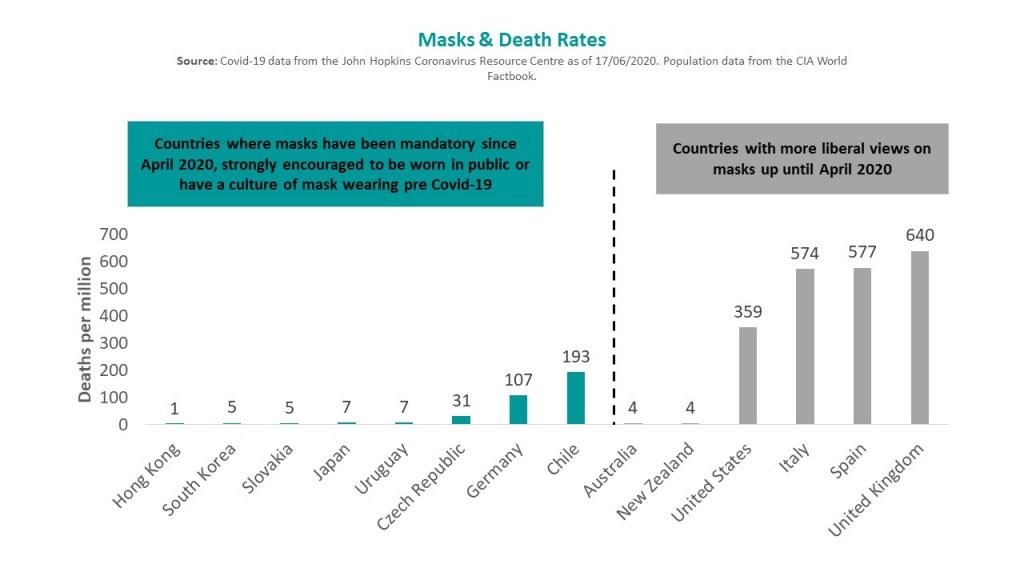Share this post
Something New
June, 2020
As the search for a cure and vaccine continues, a simple and uncelebrated method of reducing transmission of the virus has revealed itself – the humble face mask.
Face masks can be thought of as a very primitive vaccine. The analogy is quite crude since masks do not provide the user with immunity. However, immunity provides protection against a disease, and wearing a face mask can provide some measure of protection against airborne pathogens.
At the start of the pandemic, scientific advisors to the UK government were strongly against the public wearing masks because there was no “empirical” evidence that masks work. However, one does not wait for empirical evidence from the scientific authorities to know that it is probably a good idea to wear shoes if the floor is littered with broken glass.
Masks have an asymmetrical risk/reward profile – the benefits far outweigh the costs of slight discomfort or social awkwardness. A person wearing a mask reduces the volume and velocity of fluid expelled if they cough or sneeze, reducing the likelihood of transmission. Also, a person wearing a mask is less likely to touch subconsciously their mouth or nose. Finally, the right kind of mask can significantly reduce the amount of viral aerosol droplets that get into the body through the mouth or nose. The number of viral particles needed to start the pathogenesis process which eventually causes the disease is not yet known. However, a reduction of the viral droplets inhaled could help. And the price for possible protection is cheap.
Why the sermon on masks? We are certainly not medical professionals. Our job remains to protect and grow your capital during these uncertain times. However, it is interesting to note that most countries with a predisposition to wearing masks have significantly lower death rates.
The chart below shows the deaths per million due to COVID-19. Two things to note. First, we omit countries with a low corruption perception index score (score of less than 50 out of 100). This rating is provided by Transparency International and ranks countries based on perceived levels of public sector corruption. Corrupt governments are more likely to understate deaths. Second, we focus on death rates, not the number of cases because the latter can be affected significantly by the frequency of testing, thereby fudging the results.

The data, however limited, does show some correlation between mask wearing and death rates. Australia and New Zealand appear to be outliers. This could be because of strict and early lockdowns. It should be noted that there were no complete lockdowns put in place in the East Asian countries shown above.
This is not a detailed statistical study and other factors like population density and the obesity rate are likely to affect the death rate statistics. Chile for example has an obesity rate similar to the UK. Chile also happens to be the worst-hit face mask wearing country.
Why is any of this important for the economic picture? The UK has finally made it compulsory to wear face masks on public transport. Uber has also made it compulsory for passengers and drivers. While we are not a mask wearing nation, fines of £100 should slowly change people’s minds. More importantly, social proof kicks in once you get a critical mass of people wearing face masks. Most people do not want to stand out and will likely conform, hopefully.
A vaccine does not yet exist. However, a primitive “vaccine” in the form of a face mask does appear to reduce fatalities and could be the key to slowly reopening parts of the economy. Masks are just another tool in our toolbox for fighting COVID-19. They are not as effective as a potential cure or vaccine. However, unlike a potential cure or vaccine, face masks are here now and seem to provide some measure of protection against the disease for a very low price and no observable side effects.
The economic benefit of this action is to hedge our bets against a vaccine not being available for a longer period and also to allow those that are shielding potentially to re-engage with society. This is very important for the economic prospects of most countries that rely on consumer spending such as the UK and other Northern European economies.
